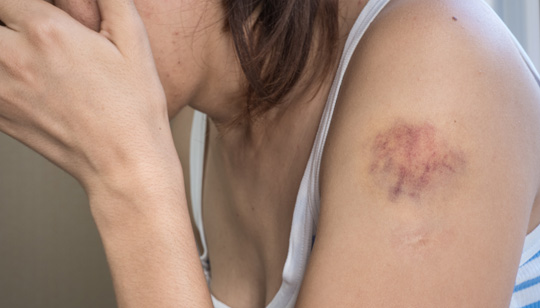Low-threshold offer: Examination center for people affected by violence
Freiburg, Feb 21, 2022
Prof. Dr. Ulrike Schmidt is certain – anyone who promptly allows signs of physical violence to be legally documented strengthens their position – especially when a complaint against the perpetrator is made later. The senior doctor at the Freiburg Institute of Forensic Medicine has been leading the USG at Freiburg University Medical Center since 2021. Kristin Schwarz spoke with her about her work.
 Even bruises that do not require medical care can be documented at the Violence Victims Examination Center. Photo: Ekaterina/stock.adobe.com
Even bruises that do not require medical care can be documented at the Violence Victims Examination Center. Photo: Ekaterina/stock.adobe.com
The Institute of Forensic Medicine opened the “Untersuchungsstelle für Gewaltbetroffene” in 2021. What are its objectives and responsibilities?
Ulrike Schmidt: We have always examined and documented the results of external force on people on behalf of law enforcement agencies. Our specialist knowledge means we are consulted, for example, when injured people want to file a complaint with police. Their injuries must be recorded, and/or rather, traces of DNA preserved. Since the update of the “Fifth Social Security Statute Book,” care and documentation following violent or sexual offenses are part of medical treatment, the costs of which are carried by health insurance funds. The USG meets the demands arising from the update.
What is your work, and the work of your team, like?
We inspect the body surface of the affected person with the utmost care, looking for scratches, bruises, and other results of external force. Even small injuries can be significant in proving a progression of events. People who’ve experienced violence cannot have “too little” to come to us. When it’s suspected that a person has been administered foreign substances, we also preserve blood and urine samples. What is more, we support colleagues at the Department of Obstetrics and Gynecology, who examine women after acute sexual assaults and treat them and record their injuries. If the women consent, we may attend the gynecological exam and preserve findings outside of the genital area. We keep all our written and photographic findings in a manner that makes them legally admissible. It’s important to mention that we neither treat acute injuries nor do we make diagnoses in this location. If someone is, for example, injured and requires medical treatment, they first need to go to the emergency room or to an established doctor. We see ourselves as supplemental to acute care because the colleagues there rarely have time during routine work for a painstaking process of documentation.
What happens to the findings afterwards?
They remain with us insofar as the police do not request them from us within the scope of our job as expert witnesses. They are subject to medical confidentiality, just like all other types of medical examinations. If the person who has been examined files a complaint, they release us from our obligation to maintain confidentiality. Then we turn over the documents at the request of police or prosecutors. Otherwise, we hold all documents in accordance with legal regulations. Blood and urine samples that are subsequently no longer analyzed are destroyed after two years.
Why can it nevertheless still be a good idea to go to the USG if a person affected by violence initially doesn’t want to make a complaint?
Take the following scenario: A person in a relationship is getting beaten up and they allow us to document the consequences without taking any further legal steps. A later incident then leads to a complaint that ends up in court. With legal documentation of previous injuries, assaults in the past can be proven admissibly in court and strengthen the complainant’s initial position. Otherwise, it’s just one person’s word against another’s. This is true especially when the previous injuries didn’t require medical treatment. Therefore, there would be no indication of them in medical records.
The team at the USG works Monday to Friday from 8 a.m. to 4:30 p.m. Perpetrators of violence don’t keep office hours. How does the USG help affected people on weekends, for example?
We work together with the local aid infrastructures above all with the counseling agencies “Frauenhorizonte e.V. - against sexual violence” and with the Freiburg Specialist Unit Intervention against Domestic Violence “Freiburger Fachstelle Intervention gegen häusliche Gewalt, (FRIG).” In special cases, the people working there can contact us outside of office hours. Then we are able to discuss together what steps are necessary and rational.
How has your service been used up to now, and by whom?
We’re satisfied with the response. Our primary users are people who are already in contact with initiatives against domestic or sexual violence or specialist units for the protection of women and children. From there, they are recommended to us. Others come from established doctors.
Neither a doctor’s reference nor preliminary talk at a counseling center are required to get an appointment at the USG?
No, the threshold for our services is low and no conditions are attached. If a person wants an appointment, they should call ahead on the phone and make one. There is no obligation to describe to us what happened nor is there to file a complaint against the perpetrator. What is more, those affected decide for themselves how comprehensively they’d like to be cared for. If it’s desired, we will refer them to counseling centers and initiatives from our network that would be able to help them further. The USG’s focus is, as has been said, not necessarily on people that need medical treatment anyway. Of course, these people can come to us as well. What we would like, above all, is that we are a place to go for people who have signs of violence on their bodies that do not require a visit to the doctor.
Website Untersuchungsstelle für Gewaltbetroffene1 (in German)


